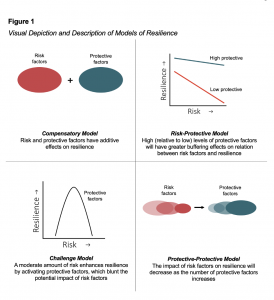
Abstract: “Emerging adulthood is characterized by marked increases in vulnerability to psychiatric illness. As such, understanding how risk and protective factors function to promote, or impede, resilience during early adulthood is critical. This pre-registered work is the first to test four extant models of resilience among emerging adults. 1,075 participants drawn from four international university sites were followed across two stressors: the transition to university and the COVID-19 pandemic. We found support for the compensatory model, which holds that risk and protective factors contribute additively to predict resilience across timepoints. Findings also support the risk-protective model, which posits that protective factors interact with risk factors in a buffering effect to reduce negative outcomes, during the university transition. Results have the potential to guide theory development by highlighting the dynamic nature of resilience and have implications for prevention and intervention efforts by underscoring the powerful influence of protective factors, regardless of risk.”
Read the pre-print here.